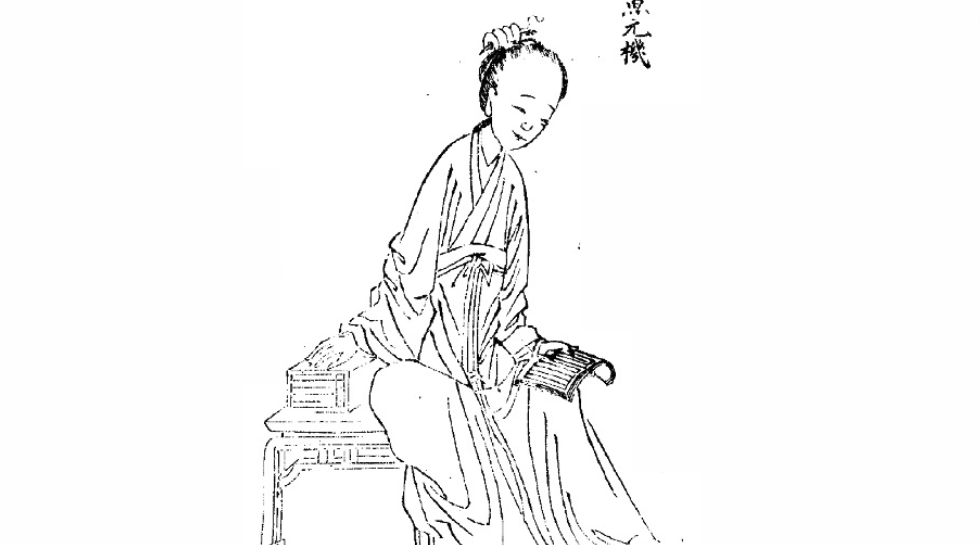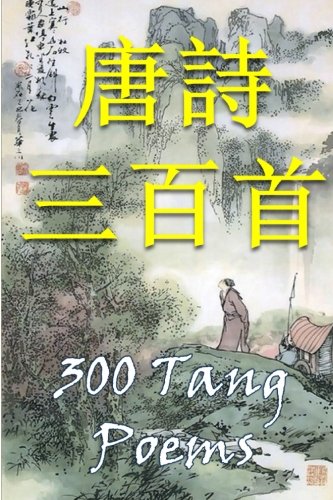The poet Yu Xuanji (840-868 CE) grew up in Chang’an, the cosmopolitan capital of the Tang Dynasty, which was ruled, in her adult years, by the infamously dissipated and negligent Emperor Yizong. When she was 16, she was purchased by a government official named Li Yi and became his concubine. In Li’s house, she would have served as a sort of “second wife” in addition to his public wife. Eventually, that public wife became so jealous that she forced her husband to send Yu away. From age 19 until her execution at 28, Yu was on her own.
In Tang China, the options for unmarried and unsupported girls and women who hoped to avoid destitution and homelessness were limited to religion or prostitution. In the nine-year span after leaving Li Yi’s house, the period of her “liberation,” Yu lived as both a Daoist nun and then a courtesan—composing, all the while, a great number of poems striking in their immediacy. The very few sources of information we have about Yu’s life are at times of questionable reliability, but paired with her autobiographical poetry they give a clear picture of a restless, ambitious young woman who aspired to a life of the mind. Today, nearly 1,200 years after her death, Yu is still remembered as one of China’s foremost female poets.
Daoism was, along with Confucianism and Buddhism, one of the major religions in Tang China. Ordination as a Daoist nun offered women opportunity for extensive travel and the cultivation of the arts and literature. Still, on first arriving at a monastery, Yu would have encountered an austere lifestyle that contrasted sharply with the extravagance of Chang’an. Tang poets describe women neophytes cutting their hair short, giving up make-up and assuming monastic garb. In an affectionate poem written shortly after her ordination, Yu herself thanks her former master for sending her a sleeping mat and contrasts her new “plank bed” with the “silver bed” in which they had slept together.
The monastery was not a pleasureless prison, however. There were religious banquets, for example, and interactions were not rigidly homosocial: men could come to visit. Yu’s poem “On Playing Ball,” in which she and other women play a game similar to polo, suggests that a Daoist nunnery might have been, at times, not so different from a fancy all-girls college. Some nuns went on to become ascetics who lived and fasted in the mountains, where they were sought out for their wisdom. Yu did not become one of those. In a poem set on a terrace at a monastery, she documents her lack of interest in an assigned curriculum:
The deck casts shadows on a path that weaves through bamboo groves.
A toppled tower of books is lost beneath my long silk sleeves.
I’ll take advantage of a painted boat and leisure time
to sing brightly. My faith: a plush tailwind will take me home.
The “painted boat” is loaded here—it evokes a distinctive demimonde, a whole subculture. On distinctively painted boats moored on rivers near Chang’an, courtesans would entertain clients, primarily students, at banquets. Stories of students who, much to the consternation of their parents, run off with a beloved courtesan are common at this time. Presenting themselves as more sophisticated than prostitutes, courtesans could talk about literature, poetry in particular, with the young men studying to take the all-important annual civil service examination, which consisted, in part, of poetic composition. We tend to think of poetry and bureaucracy as diametrically opposed, but during the Tang Dynasty they richly overlapped. Indeed, writing poetry was an essential skill for government officials, since poems often appeared in professional correspondence such as letters of introduction and recommendation.
The few students who passed the exam were fast tracked to prestigious careers in the government. As Yu rubbed elbows with those students, she clearly resented the fact that, as a female, she was excluded from taking it. A poem about her visit to a tower to view the posted names of the young men who had passed the exam seethes with envy:
My gaze is full of cloudy heights on a bright day in spring.
Under the winners’ fingers, silver script is flourishing.
I can’t help hating this inane silk gown that veils my poems.
I lift my eyes and helplessly despise a list of names.
This quatrain unfolds visually from Yu’s perspective. In what is initially a tranquil spring day, she looks up at the surrounding mountain peaks, suggestive, perhaps, of ambition or success. From the tower, she looks down at the students who passed the exam writing out poems in calligraphy, another essential skill for Tang gentlemen. She then retreats to an internal space where her jealous frustration lashes out at the injustice of her exclusion from the contest on the basis of her gender, represented by feminine attire. The final line unites looking up and “looking down,” when she enviously glares at the list of winning students’ names posted on the wall.
Her frustration was entirely justified. What we have of her work rivals that by contemporary male poets. She really had it all—the sensibility, the ear and the fascination. One of her poems shows her doting on the facets of a gemlike line of verse she has created:
A new line comes, and I repeat the sounds with rapt insistence.
Each time the words chime wholly golden, different feelings swell.
Yu was not entirely isolated in her creative work. At some point, she struck up a literary friendship with Wen Tingyun, a disaffected libertine at least 30 years her senior. Wen had founded the school of flowery Cí poetry. Adapted from the songs of Central Asian courtesans and acrobats, this lyrical form came to be commonly used by men and women for billets-doux and invitations to trysts in the pleasure districts of Chang’an. One source attests that Yu and Wen had a sexual relationship, and we do have a number of question-and-answer exchanges in verse between them. Certainly Yu had multiple lovers; her precarious financial situation required them. She wrote a number of poems-cum-love-letters, addressed to the absent men in her life:
I drink and sing whenever I’m awake
because I miss you and it’s spring again.
Yu also took female lovers, and she is often hailed as one of China’s first openly bisexual women. Her longest extant work, “The Three Sisters,” is a lesbian love poem that extols three orphans—real-life neighbors of Yu—who go on to become courtesans and renowned musicians. In the course of the poem, which Yu narrates, the four of them drink wine together. One of the sisters plays the zither while Yu talks to the other two. After a series of suggestive images involving dew drops and willow mist, Yu declares that if the sisters could only stay a few more days, they would no longer be ignorant of “blowing the syrinx,” or a panpipe—a not-so-subtle metaphor for cunnilingus. Daoism and prostitution merge when Yu describes the sisters’ relationship with “Amah” (the Nanny), a colloquial name for the Daoist Queen Mother of the West. The patron goddess of prostitutes and women musicians, she was said to care for all women Daoists, both devout practitioners and wayward aspirants. In adoration of the three sisters’ youth and innocence, Yu concludes, “Dying while looking on their fresh pink faces would be sweet.”
Moments of conviviality and immediate, genuine human connection, such as we find in “The Three Sisters,” are rare in Yu’s work. Loneliness haunts her poems, not just the normal kind, but an especially desperate variety because she needed others, friends, clients, anyone with money, to survive. Alcohol helped ease the pain; in one poem she advises a friend, “Get a good wine on lonely nights and then you aren’t alone.” She lived and did her work, at least for a time, on a painted boat on the Wei River, and images of boats adrift and distant from any mooring recur in her poetry. She almost always seems unsettled. The image of the fervid moth at the end of this poem written after a series of trysts best captures her agitation:
We spent some satisfying midnights in the Tower of Qin.
It shocks me when a man, a very god, has up and gone.
Shutting out thoughts of where the clouds all go, I start to doze:
a wild moth fluttering around a cracked lamp’s faulty blaze.
The anonymously penned “The Little Tablet from Three Rivers” (which should be called “The Little Tabloid”) recounts, among other sensationalistic material, the events that led to Yu’s execution in 868. Though written only 12 years after Yu’s death, “The Little Tablet” is unreliable because the anonymous author clearly has a prejudice, painting her, one-sidedly, as a promiscuous libertine. According to this source, Yu strangled a young woman named Luqiao, a handmaid or Daoist novice, to death. For this crime she was sentenced to capital punishment and beheaded.
Rather than end with scandal and decapitation, it is better, fairer, to round out Yu’s tumultuous adulthood and neglected work with a blissful moment of revelation and acceptance. Though never an ascetic, Yu attains a kind of enlightenment in this poem set in a mountain village, comparing herself to the poor but famously happy Yan Yuan, known also as Yan Hui, a disciple of Confucius. For a time—brief perhaps—during her liberation, she was at last freed from the desires and ambitions that had ruled her life:
Colors and tones are back there clashing in the world of men;
all by myself, I’m out here chanting in the bright sunshine.
What are those precious darlings chasing shiny triteness for?
The right rhyme, when the time is ripe, comes knocking on your door.
I blush to thank the flowers here for being so white and plain.
Off in an alley, in a hut, my wrongness learns Yan Yuan.
It’s no use craving wanting, craving happy-lover scenes.
Here in the mountains vines reach way up to the pine trees’ crowns.



